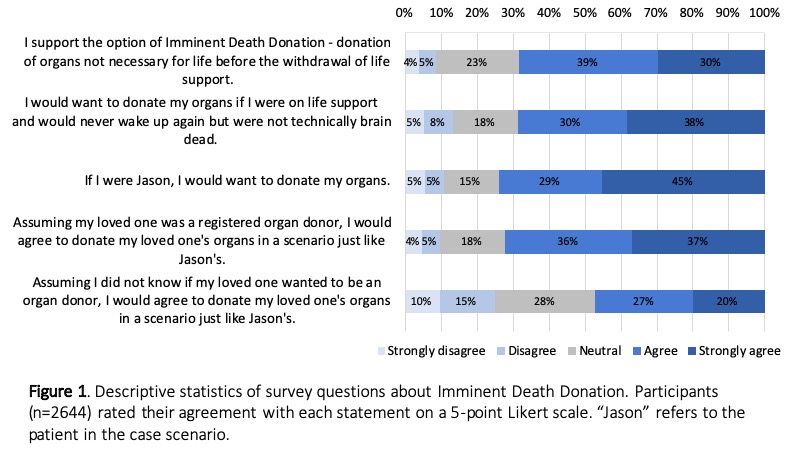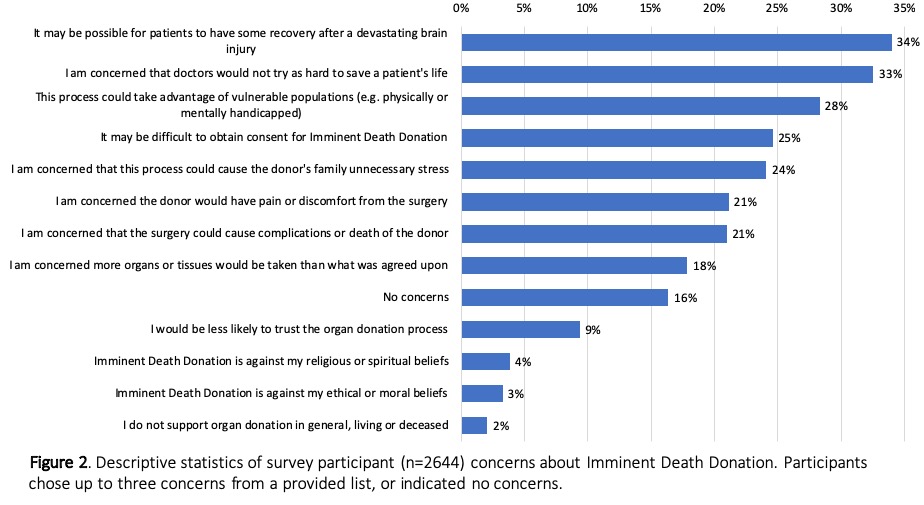Survey of Public Attitudes Towards Imminent Death Donation in the United States
1Division of Abdominal Transplantation, Baylor College of Medicine, Houston, TX, 2Department of Surgery, Ohio State University, Columbus, OH, 3Rice University, Houston, TX, 4Department of Bioethics, Columbia University, New York, NY
Meeting: 2020 American Transplant Congress
Abstract number: C-256
Keywords: Donation, Public policy
Session Information
Session Name: Poster Session C: Non-Organ Specific: Public Policy & Allocation
Session Type: Poster Session
Date: Saturday, May 30, 2020
Session Time: 3:15pm-4:00pm
 Presentation Time: 3:30pm-4:00pm
Presentation Time: 3:30pm-4:00pm
Location: Virtual
*Purpose: Imminent Death Donation (IDD) has been proposed as a method to increase the number of high-quality organs available for transplant. Although IDD was ethically justified by UNOS, the concept remains controversial due to presumed lack of community support and the potential to violate the public trust. The aim of this study was to evaluate the feelings, attitudes, and beliefs the public has towards IDD.
*Methods: An online survey was conducted of a nationally representative sample of US adults age >18 through QuestionPro. Participants responded to a hypothetical scenario in which a family decides about IDD, described as living organ donation prior to a planned withdrawal of life-sustaining care in a patient with a devastating brain injury. Responses were assessed on a 5-point Likert scale.
*Results: Results included responses from 2644 US adults (52% response rate). 68% to 74% of participants agreed or strongly agreed with IDD when posed as a general question, in relation to the patient in the scenario (Jason), when donating their own organs in a similar scenario, and when donating the organs of a loved one (Figure 1). The exception to majority agreement was with donation of a loved one’s organs whose wishes were unknown. The major concerns of participants included possible “recovery after a devastating brain injury” (34%), and that “doctors would not try as hard to save a patient’s life” (33%) (Figure 2). Some participants indicated no concerns (16%) and only 9% would be less likely to trust the organ donation process.
*Conclusions: Our study demonstrates strong public support for IDD in the case of a patient with a devastating brain injury who was not legally brain dead. Notably, participants were not largely concerned with losing trust in the organ donation process, which has been a major barrier to implementation of IDD from an institutional standpoint. The large public support for IDD justifies continued research in order to serve the values of the public.
To cite this abstract in AMA style:
Washburn L, Galvan T, Moolchandani P, Rath S, Ackah R, Parsons S, Brown RP, Ranova E, Goss M, Rana A, Goss JA. Survey of Public Attitudes Towards Imminent Death Donation in the United States [abstract]. Am J Transplant. 2020; 20 (suppl 3). https://atcmeetingabstracts.com/abstract/survey-of-public-attitudes-towards-imminent-death-donation-in-the-united-states/. Accessed February 23, 2026.« Back to 2020 American Transplant Congress


